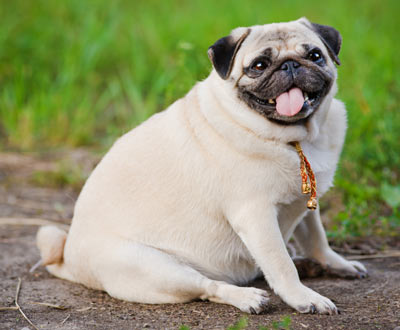Dog Breeds More Prone to Becoming Obese

Obesity is an increasingly important problem in dogs, and it can, in turn, increase the risks for certain other illnesses such as diabetes, heart disease, and joint problems.
There are certain dog breeds that seem to be more at risk of becoming obese than others, so it's even more crucial that these dogs be kept trim.
Basset Hounds
Basset hounds have short legs and don't move too quickly. That can mean that they don't burn as many calories as other dogs when they go out to play or walk. Because of this, basset hounds are more prone than other breeds to becoming overweight.
Pugs
Pug dogs have flat faces and short airways, so they are unable to do strenuous exercise. They are also more prone to overheating than other dogs, so that can further limit the amount of exercise they can do. Because of this, pugs are usually lapdogs that get lots of treats and little exercise.
Dachshunds
Dachshunds are small dogs that easily put on weight if they don't get enough exercise. Bred as hunting dogs, Dachshunds weren't meant to be lapdogs, and they easily become overweight. Because of their long backs, they are already prone to intervertebral disc disease, and that risk increases when they are overweight.
Labrador and Golden Retrievers
Retrievers are dogs that really love their food and people love to give them extra treats. They also like to stick close to their human friends, so if you aren't very active, your retriever probably won't be, either.
Chihuahuas
Another small breed dog that tends to become overweight easily is the Chihuahua. These dogs often become lapdogs that are carried to and fro, and many of them don't get much exercise. When their tiny frames carry extra weight, Chihuahuas are prone to diabetes, heart disease, and joint problems.
Keeping Your Dog Fit and Trim
All dogs will become overweight if they routinely take in more calories than they burn. If your dog is a member of one of the breeds above, you will need to take even more care to keep him at a healthy weight.
Check with your veterinarian to determine the ideal weight for your particular dog. Charts that give average weights for certain dog breeds can be highly inaccurate when applied to an individual dog.
Be sure you're feeding your dog the proper diet type for his life stage. Older dogs shouldn't get puppy food, for example.
Ask your veterinarian what type and how much exercise is appropriate for your dog. Find something that you both like to do and stick to a routine.
Use praise and play time as rewards and attention more than treats.
Learn more here: "Dog Weight Loss: Tips For Helping Your Dog Lose Weight."
You May Also Like These Articles:
Warning Signs of Cancer in Dogs
Dogs with Arthritis May Benefit from Stem Cell Therapy
Disclaimer: This website is not intended to replace professional consultation, diagnosis, or treatment by a licensed veterinarian. If you require any veterinary related advice, contact your veterinarian promptly. Information at DogHealth.com is exclusively of a general reference nature. Do not disregard veterinary advice or delay treatment as a result of accessing information at this site. Just Answer is an external service not affiliated with DogHealth.com.


